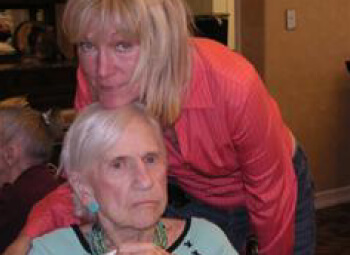I wasn’t sure I’d survive the 2010 holiday season, gasping for New Year’s air after the most gut-wrenching experience of my life. It left me damaged. I’ve learned a mother lode bout ego, greed and betrayal and I’ve woken up (rudely) to the fact that “family” as you once knew it can evaporate when agonizingly tough decisions must be made and when ego prevails.
As baby boomers, we’re faced with tests pertaining to the topic of aging parents for which we couldn’t possibly study. We’re not perfect. Because we don’t have all the answers at times when we need them most, we fall prey to potentially precarious situations—ok, people—even as we scratch and claw, trying desperately and honestly “to do the right thing,” whatever that is. We do this even if the parent/child relationship hasn’t been ideal, if it’s left scars we’ll carry ‘till parents’ death do us part. Yes, we’ve heard the advice, thank you. “Forget about it and go on with your life. That was then: This is now.” Mom’s voice, whether kind or not, is always with me.
Brothers and Sisters
Pre-Christmas 2010, I devoured a holiday post by Mark Lachs, M. D., on Huff Post. “Yeah, he really gets this,” I said out loud, happy to have “company.” He’s director of geriatrics for the New York Presbyterian Health System, and among his keenly astute observations:
1) You don’t really believe those sibling rivalries actually died when you left the sandbox or moved out, do you?
2) Another point: Family caregiving is a decidedly sexist business; caregivers are overwhelmingly adult daughters or other women in the family even when there are many adult sons. Men, step up to the plate, and at the very least don’t criticize your sister if she’s doing the heavy lifting until you do some yourself.
Never Leave
Things would have been quite different if I had stayed in Charlotte, never venturing to New York, Houston, Denver, San Antonio, London—that was “me”—Auckland, Los Angeles and Orange County. Truth is, I couldn’t wait to sew my wanderlust seeds, even as a child. I thought I didn’t really “belong” on the East Coast—wasn’t sure where I did.
I could have supervised things better if I’d been near my mother as she began to fail on a multi-system level, with Alzheimer’s the most unwelcome perpetrator. I, however, chose to do as she’d told me to do: to live my life. Then she began to lose herself and begged me to return from beloved New Zealand, to relinquish my hard-earned residency. I did come “home” summer of 2007—for six months with her—and when I left, she cried. Then I cried. I could never please her, it seemed, especially when she obviously needed me most. I bear that guilt, for all she wanted was family around her as she began her end. It’s what we all want. It’s what families do. But when another family member is close and doesn’t share the burden, chaos can reign. Someone has to do something when bad decisions are being made.

In her Sleep
I can’t go back and “do it again.” Mom died July 2010 of cardiac arrest, and she was ready. I was ready for her, too, for it was all too devastating to count all the problems she had, from which she’d never recover. I did promise to see her almost daily in the last few months, to apply her mascara, match her shoes to her clothes, treat her with chocolate and nag her caregivers about minutia important only to me.
She’d lost so much: her fierce independence, her friends who were afraid of mirroring themselves, her memory, her movement, her ability to speak and understand, control of her bodily functions and much more. But no matter where I was in this world, she never really lost me.